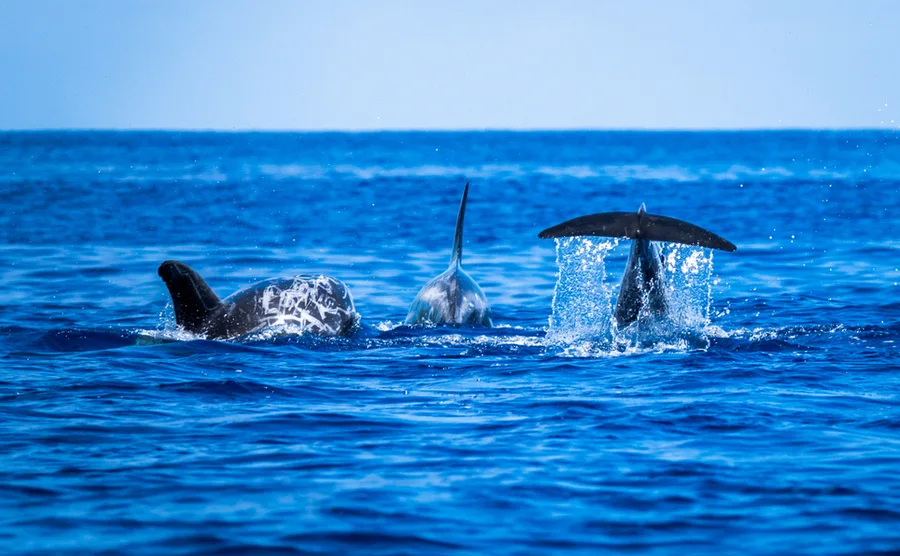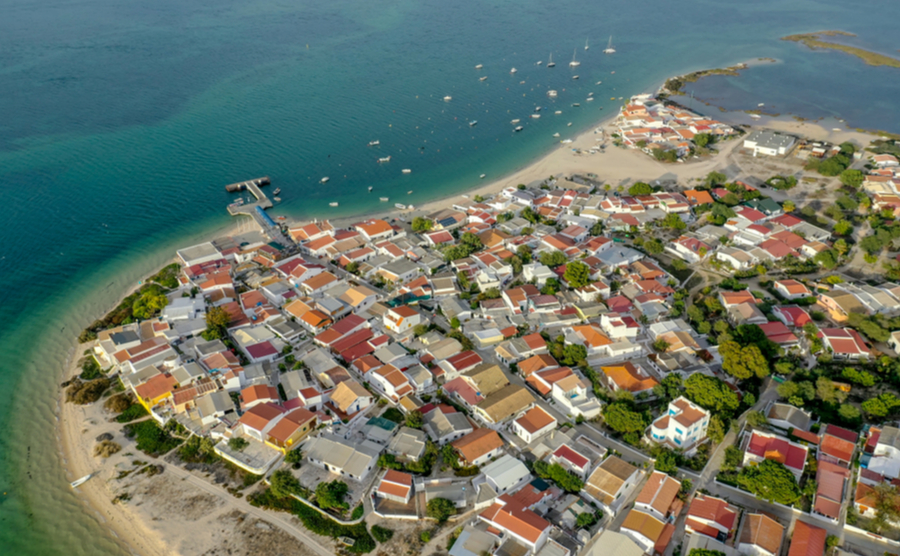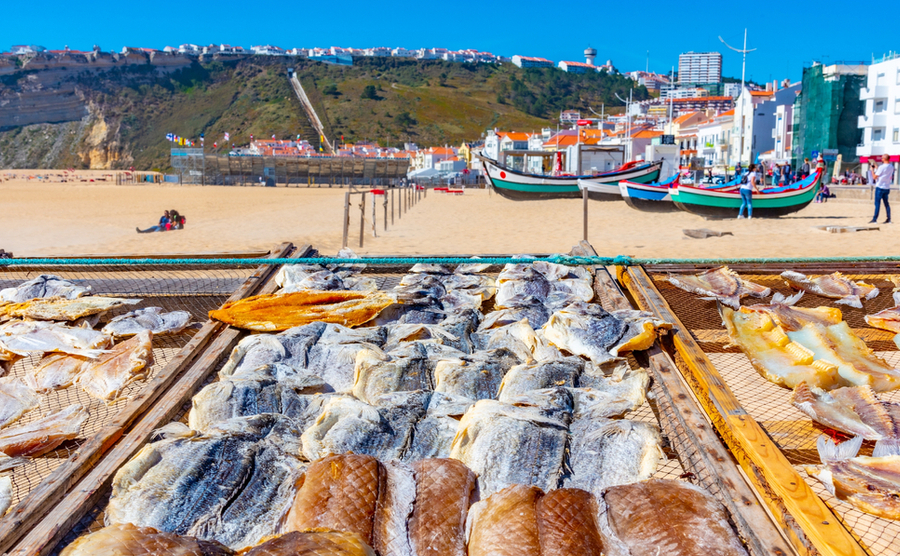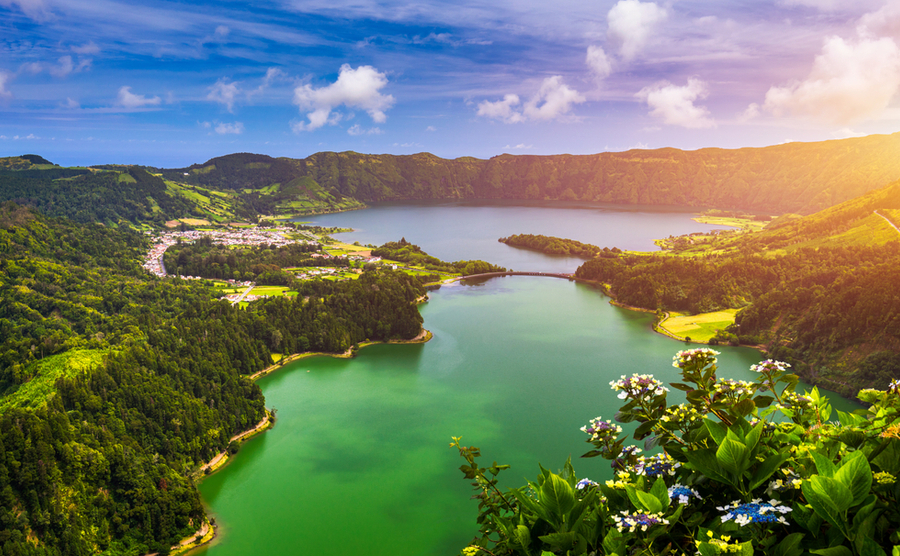World Oceans Day is an annual event, conceived back in 1992 at Rio de Janeiro’s Earth Summit. It’s intended to raise awareness of threats to marine life and the wider environment. Unsurprisingly, World Oceans Day has a clear focus on climate change, and the impact of plastic waste on our seas and marine life.
This year’s World Ocean Day falls on Thursday, 8th June. In this article, we look at the abundant ocean life in and around Portugal, and what’s being done to protect it.

Risso’s dolphins at Pico, in the Azores, Portugal
Ocean life in Portugal: Dolphins, whales and sharks
With nearly 1000km of coastline around the mainland and another 917km surrounding the Azores and Madeira islands, it’s not surprising that ocean life in Portugal is so rich. Dolphin and whale watching is extremely popular, both off the coasts of the Algarve and Lisbon, and around the islands. In fact, many people specifically travel to the Azores to see whales and dolphins.
Of course, there’s considerable debate around the ethics of whale watching and similar activities. Those concerned by this will be pleased to know that many companies operate with conservation and respect for animals firmly in mind. For example, Terra Azul, a whale-watching and wildlife tour company that operates in the Azores, is certified by the World Cetacean Alliance (WCA). It’s also involved in the MONICET project, which gathers data on the populations of the animals.
Species frequently spotted off Portuguese coasts include killer whales (orcas), bottlenose dolphins, humpback whales, minke whales and harbour porpoises. There are also blue sharks and hammerhead sharks.
Occasionally, these make an appearance disconcertingly close to the beach. Barril beach, near the east Algarve city of Tavira, seems to be a popular hotspot. In 2017, 2020 and 2021, the red flag was raised after shark sightings – each time making for a local talking point.

Olhão island Armona in Ria Formosa, Portugal
Seahorses
Moving from big and scary to small and cute, seahorses can be found not far from Barril. The Ria Formosa, of which Barril is a part, boasts one of the world’s largest seahorse populations.
Popular jump-off points for spotting seahorses include Fuseta and the Ilha de Faro, right next door to the Algarve’s airport. Organised tours are available, but with the right local knowledge it’s sometimes possible to locate them solo. Kayakers departing from Tavira island are good people to ask. All you need is a snorkel and plenty of patience!
Browse homes in the Algarve today
Fish
Portugal’s oceans are teeming with fish, hence snorkelling and diving are both popular pastimes.
Praia do Camilo, just south of Lagos, is perhaps the Algarve’s number one snorkelling spot. The rocky islets can be reached directly from the beach. Currents can be strong, and the water surprisingly cold (people often forget that this is the Atlantic, and not the Mediterranean!)
As well as an abundance of seabass, sargo and bream in this area, you can also spot lobsters in their natural habitat, along with rainbow wrasse, sergeants and salema porgys.
Nearer to Lisbon, Sesimbra beach is a popular place for snorkelling and diving. It’s reportedly home to over 1350 species. A shipwreck site is particularly popular with advanced divers. Meanwhile, the less ambitious can find still exotic tompot blennys, flounders, gunards and wahoos in easier to reach locations.
Arguably the best diving and snorkelling is to be found around the Azores islands and Madeira. In the Azores there are mobula and manta rays. Maderia boasts barracudas, giant anemones, parrotfish, and many species of octopus.

Seafood drying in the sun. Nazare, Portugal
Conservation
When thinking about ocean life in Portugal, it’s impossible to overlook the fact that the country is a huge seafood consumer . Second only to Iceland in Europe, seafood consumption per capita in Portugal stands at 57kg per year. This is considerably more than Spain’s 42kg – and triple the 19kg per person in the UK.
This obvious question is whether this is sustainable.
While the country has committed to “having 100% of fish stocks fished in (its) waters within sustainable limits by 2030”, there is much work to do. On an individual level, people are being specifically advised to try to eat less shrimp and crayfish, and to cut down on species such as tuna cod and salmon. The fact that Portugal is the world’s second largest shark meat exporter is also something that’s under the microscope. However, it’s encouraging to see steps being taken towards the 2030 goal.
While that work is in progress, many organisations and individuals put considerable effort into protecting ocean life in Portugal. Initiatives range from local beach clean-ups, often arranged by local Facebook groups, to work done by national and international marine conservation charities.

Camara de Lobos, a harbor and fishing village in Madeira, Portugal
Examples include:
Ocean Alive: A marine conservation project based around the Sado estuary, Ocean Alive works to protect the seagrass meadow habitat that’s home to dolphins as well as fish and shellfish.
Initiatives Océanes: Part of a global beach clean-up initiative, Initiatives Océanes was formed back in 1998 by the Viana de Castelo chapter of the Portuguese Surfrider Foundation. It now has a presence in Peniche, Porto, Lisbon, Ericeira and the Azores. The group arranges regular beach clean-ups, including annual events on the first weekend of spring.
Oceano Azul Foundation: This organisation studies marine protected areas, runs education programs in schools, and works to build awareness around ocean sustainability.
The marine life in Portugal offers a huge amount for people to enjoy – from spotting exotic ocean life to tucking into the freshest catch. However you choose to interact with it, it should be possible to do so sustainably, by supporting local initiatives, choosing companies that do things in an ethical way. Those who do eat seafood should try to do so mindfully, and with thought given to which species are under threat.
As we are sure to be reminded on World Oceans Day, these habitats need and deserve our protection.











